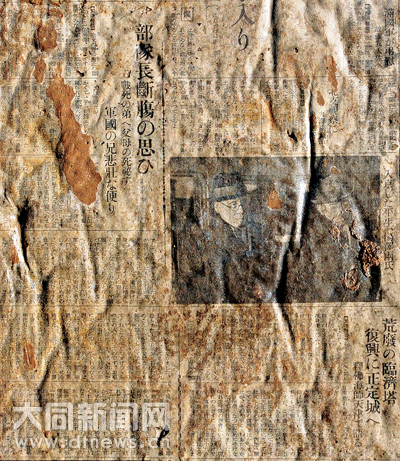 |
|
The Folk Museum in the city of Datong, Shanxi province recently put a historical piece on display that was discovered at a former Japanese military site during the War of Resistance against Japanese Aggression (1937-1945), where city archaeologists described it as a Japanese newspaper imprint. |
Japan lost the war against the allied forces 70 years ago, but it should not lose its conscience on the question of the war 70 years later. This is what Chinese Foreign Minister Wang Yi told a Japanese reporter on Sunday at a sideline news conference of the annual session of the National People's Congress.
This reporter said that many Japanese people believe that China has long used the war Japan waged against it as a weapon to discredit the contribution Japan has made to the world peace. He asked Wang whether China should adjust its policy toward Japan.
It is true that Japan's invasion of China more than 70 years ago has long been a sticking point in China-Japan relations. But Wang recalled what a veteran Chinese diplomat once said: the more a perpetrator remembers the harm he inflicted on his victim, the more possible it is for the victim to recover from the misery that has been suffered.
To be exact, it is the Japanese leaders' attitude toward the war that matters.
Given the heavy casualties Asian countries suffered in the war against Japanese aggression, the miseries their people went through and the humiliation forced upon them, it is never too much for these Asian countries to require a sincere apology from Japan.
And it is natural for Chinese people and people in other Asian countries to feel uncomfortable when Japanese politicians in their official capacity visit the Yasukuni Shrine where 14 class-A Japanese war criminals are enshrined.
It is also natural for people in these countries to be angry when some Japanese politicians openly deny the fact that women in these countries were forced to serve as comfort women to the invading Japanese forces.
If anything, the ball is in Japan's court. Japanese leaders need to put themselves in the shoes of their Asian neighbors when it comes to their country's unpleasant dealings on the question of the war, rather than stubbornly thinking it is unfair for Japan to always have its past pushed in its face.
China is going to have a military parade this year to mark the victory in the anti-fascist war. Foreign Minister Wang Yi said that invitations will be offered to all relevant state leaders and international organizations. Japanese Prime Minister Shinzo Abe will, of course, get one.
It is a good opportunity for him and his cabinet to throw away the burden of the war by facing up to Japan's past.